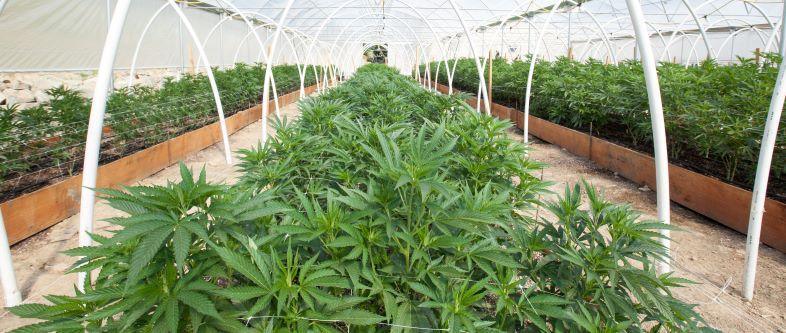Customer Stories
LOCATION: Washington State
Streamlined For Success
A cannabis operation finds the right solution to meet the stringent regulatory demands of its industry
Jeff Hubbard is the owner of Constellation Cannabis, one of the largest cannabis grow facilities in Washington state. The Arlington facility is 42,000 square feet, of which 30,000 square feet is grow space. Because of the heavily regulated nature of the industry, the company would have to meet strict requirements before it began production and that meant developing a camera design with 100 cameras that would exceed regulatory requirements.


Streamlined For Success
A cannabis operation finds the right solution to meet the stringent regulatory demands of its industry
Jeff Hubbard is the owner of Constellation Cannabis, one of the largest cannabis grow facilities in Washington state. The Arlington facility is 42,000 square feet, of which 30,000 square feet is grow space. Because of the heavily regulated nature of the industry, the company would have to meet strict requirements before it began production and that meant developing a camera design with 100 cameras that would exceed regulatory requirements.


Extraordinary Requirements
In a new industry with strict regulatory requirements, the video surveillance system is everything but ordinary. First, it had to be a modular system to allow the company to scale it through the multi-phase project. Also, it had to take into account the unique nature of the project.
Before Constellation could even begin growing cannabis, it had to have a license for the property, then develop an operating plan- essentially an operational blueprint of the building for the Liquor Control Board (LCB). The plan clearly delineates where in the building seeds would be stored, where vegetative growth would take place, where the flower room and waste quarantine would be, and where concentrates production and processing would take place.
From seed to sale, everything that would occur must be captured on camera at all times, and every recorded interaction of an employee with a plant must include visibility of the employee’s head, hands, and feet at all times- and the footage must be maintained for at least 45 days. Even plant waste and dead plants must be on camera at all times.
“If we have a plant that dies, we can’t just take that plant and throw it in the compost pile; the plant is tagged, so we scan the plant, we notify the LCB that the plant has died, and we remove the plant from our gardens,” Hubbard said. ” But it needs to sit in our quarantine space for 72 hours because that gives the LCB three days to come out to our farm and do a spot check inspection if they are so inclined and say, ‘ Yep, you had one plant die- here it is.’ And then we could go into the camera system, and we need to maintain footage of all our plants for 45 days.”
Until all of this and more could be demonstrated to the LCB, Constellation could not grow a single plant, and therefore could not generate revenue. Clearly, the last thing they needed was for the video surveillance system to hold the process up.
Ninth Hour Scrambling
In phase one of the project, Constellation was using about a 50/50 mix of Dahua and other cameras. They originally contracted for 80 cameras, but, due to some blind spots and some expansion during the initial phase,
Hubbard says, they needed to upgrade to 100 and a partner to help them. Hubbard met with Blake Albertsen, regional sales manager – Pacific Northwest/Western Canada, Salient Systems, who walked those at Constellation through the features and capabilities of the Salient system. In an industry as new as the cannabis industry, it is often difficult for company owners to know who has the skill set necessary to deliver and follow through with meeting their unique needs. However, after meeting with Albertsen, Hubbard knew he had found the right partner.





“Based on the strength of that presentation and of Blake himself as a person,” Hubbard said. “We felt comfortable in engaging in a contract with Salient. “
With the Salient server, they were able to seamlessly upgrade, get licenses in place and meet their phase one footprint.
Unfortunately, however, because of the size and scope of the project, the need for a modular system and the burdensome regulations, the integrator Constellation had initially been working with was unable to meet its needs, and so Constellation now found itself in search of a new integrator. Hubbard said he called Albertsen and expressed his frustration of having a capable Salient system but being unable to use it. Although Salient was not obligated to, Albertsen agreed to help Constellation find an integrator suited for the task.
“It was a very stressful time in the business,” Hubbard said. “I am eternally grateful for the help in finding us a new integrator, lending us engineering time to get our system operational and get us past our camera inspections to allow us to activate our cannabis license.”
And so what had begun to look like a disaster was now back on track and humming along smoothly. Hubbard said Constellation plans to continue its relationship through the second and third phase of building out the facility.
“Cannabis is a new industry, and a lot of people are trying to make a quick buck,” Hubbard said. “There is a steep learning curve, and that is why we decided to go with professionals.”
Part of what makes Salient so successful is its commitment to being “Clean Green Certified.” Because the USDA does not recognize cannabis as a legitimate agricultural crop, cannabis cannot be legally called “organic.”
Therefore, the Clean Green cannabis processor/ handler certification was established in 2004 as a way to regulate legal cannabis products that would otherwise have called their products organic.
Indeed, 40 percent of the cannabis licenses in Washington are inactive, Hubbard explains, because many people don’t realize the regulatory burden placed on the industry and the capital costs required to navigate those burdens.
